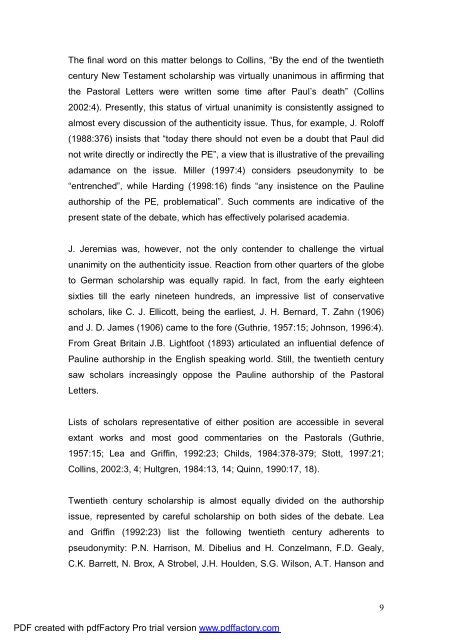A Text centred rhetorical analysis of Paul's Letter to Titus
A Text centred rhetorical analysis of Paul's Letter to Titus
A Text centred rhetorical analysis of Paul's Letter to Titus
Create successful ePaper yourself
Turn your PDF publications into a flip-book with our unique Google optimized e-Paper software.
The final word on this matter belongs <strong>to</strong> Collins, “By the end <strong>of</strong> the twentieth<br />
century New Testament scholarship was virtually unanimous in affirming that<br />
the Pas<strong>to</strong>ral <strong>Letter</strong>s were written some time after Paul’s death” (Collins<br />
2002:4). Presently, this status <strong>of</strong> virtual unanimity is consistently assigned <strong>to</strong><br />
almost every discussion <strong>of</strong> the authenticity issue. Thus, for example, J. Rol<strong>of</strong>f<br />
(1988:376) insists that “<strong>to</strong>day there should not even be a doubt that Paul did<br />
not write directly or indirectly the PE”, a view that is illustrative <strong>of</strong> the prevailing<br />
adamance on the issue. Miller (1997:4) considers pseudonymity <strong>to</strong> be<br />
“entrenched”, while Harding (1998:16) finds “any insistence on the Pauline<br />
authorship <strong>of</strong> the PE, problematical”. Such comments are indicative <strong>of</strong> the<br />
present state <strong>of</strong> the debate, which has effectively polarised academia.<br />
J. Jeremias was, however, not the only contender <strong>to</strong> challenge the virtual<br />
unanimity on the authenticity issue. Reaction from other quarters <strong>of</strong> the globe<br />
<strong>to</strong> German scholarship was equally rapid. In fact, from the early eighteen<br />
sixties till the early nineteen hundreds, an impressive list <strong>of</strong> conservative<br />
scholars, like C. J. Ellicott, being the earliest, J. H. Bernard, T. Zahn (1906)<br />
and J. D. James (1906) came <strong>to</strong> the fore (Guthrie, 1957:15; Johnson, 1996:4).<br />
From Great Britain J.B. Lightfoot (1893) articulated an influential defence <strong>of</strong><br />
Pauline authorship in the English speaking world. Still, the twentieth century<br />
saw scholars increasingly oppose the Pauline authorship <strong>of</strong> the Pas<strong>to</strong>ral<br />
<strong>Letter</strong>s.<br />
Lists <strong>of</strong> scholars representative <strong>of</strong> either position are accessible in several<br />
extant works and most good commentaries on the Pas<strong>to</strong>rals (Guthrie,<br />
1957:15; Lea and Griffin, 1992:23; Childs, 1984:378-379; S<strong>to</strong>tt, 1997:21;<br />
Collins, 2002:3, 4; Hultgren, 1984:13, 14; Quinn, 1990:17, 18).<br />
Twentieth century scholarship is almost equally divided on the authorship<br />
issue, represented by careful scholarship on both sides <strong>of</strong> the debate. Lea<br />
and Griffin (1992:23) list the following twentieth century adherents <strong>to</strong><br />
pseudonymity: P.N. Harrison, M. Dibelius and H. Conzelmann, F.D. Gealy,<br />
C.K. Barrett, N. Brox, A Strobel, J.H. Houlden, S.G. Wilson, A.T. Hanson and<br />
PDF created with pdfFac<strong>to</strong>ry Pro trial version www.pdffac<strong>to</strong>ry.com<br />
9

















